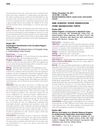 28 citations,
August 2018 in “Dermatologic Surgery”
28 citations,
August 2018 in “Dermatologic Surgery” Platelet-Rich Plasma (PRP) may help improve hair density in primary cicatricial alopecias (PCAs) patients, but more trials are needed to confirm its benefits.
 September 2005 in “Clinics in Plastic Surgery”
September 2005 in “Clinics in Plastic Surgery” The document provides a comprehensive index of medical and surgical topics, including hair removal, hair restoration, and various treatments for injuries and conditions.
 146 citations,
July 2018 in “Regenerative Medicine”
146 citations,
July 2018 in “Regenerative Medicine” Understanding different types of skin cells, especially fibroblasts, can lead to better treatments for wound healing and less scarring.
 78 citations,
February 2011 in “Canadian Medical Association Journal”
78 citations,
February 2011 in “Canadian Medical Association Journal” Acne treatment varies, with topical and systemic therapies effective, and more research needed on treatment order and long-term effects.
 40 citations,
June 2013 in “Molecular Pharmaceutics”
40 citations,
June 2013 in “Molecular Pharmaceutics” The gelatin/β-TCP scaffold with nanoparticles improves wound healing and skin regeneration.
 25 citations,
September 2014 in “Dermatologic Surgery”
25 citations,
September 2014 in “Dermatologic Surgery” Hair transplants can effectively treat hair loss from CCCA in African American women if there's no inflammation.
 9 citations,
November 2008 in “Facial Plastic Surgery”
9 citations,
November 2008 in “Facial Plastic Surgery” Effective scalp reconstruction requires a wide range of surgical skills and an understanding of hair biology.
 71 citations,
February 2020 in “Journal of Translational Medicine”
71 citations,
February 2020 in “Journal of Translational Medicine” Progress has been made in skin and nerve regeneration, but more research is needed to improve methods and ensure safety.
 44 citations,
April 2012 in “American Journal of Clinical Dermatology”
44 citations,
April 2012 in “American Journal of Clinical Dermatology” Scarring alopecias are complex hair loss disorders that require early treatment to prevent permanent hair loss.
 24 citations,
January 2021 in “Dermatologic Therapy”
24 citations,
January 2021 in “Dermatologic Therapy” Platelet-rich plasma (PRP) is a safe and potentially effective way to treat hair loss, especially when combined with minoxidil.
 18 citations,
January 2004 in “Dermatologic Clinics”
18 citations,
January 2004 in “Dermatologic Clinics” Skin problems in older people can indicate hormonal diseases, nutritional deficiencies, or conditions like diabetes, menopause, and HIV.
 17 citations,
December 2019 in “Stem Cells International”
17 citations,
December 2019 in “Stem Cells International” Bioactive molecules show promise for improving skin repair and regeneration by overcoming current challenges with further research.
 7 citations,
September 2015 in “Actas Dermo-Sifiliográficas”
7 citations,
September 2015 in “Actas Dermo-Sifiliográficas” Hair transplantation for Frontal Fibrosing Alopecia may work if done after the disease is inactive for 2 years and with ongoing treatment after surgery.
 5 citations,
November 2011 in “Expert Review of Dermatology”
5 citations,
November 2011 in “Expert Review of Dermatology” The document concludes that early diagnosis and a comprehensive treatment plan are crucial for managing hair loss in children, with a focus on both medical and psychological support.
 1 citations,
January 2021 in “Dermatologic Therapy”
1 citations,
January 2021 in “Dermatologic Therapy” Trichobiolight effectively treats hair loss with 82.5% success.
 1 citations,
December 2011 in “Journal of The American Academy of Dermatology”
1 citations,
December 2011 in “Journal of The American Academy of Dermatology” The book concludes that treating acne scars requires a variety of methods and patience, with no single best way to classify or treat them.
 1 citations,
June 2008 in “The Journal of Urology”
1 citations,
June 2008 in “The Journal of Urology” Dihydrotestosterone gel before hypospadias surgery led to less scarring but raised concerns about potential psychological effects and skin changes.
 February 2024 in “Sohag Medical Journal”
February 2024 in “Sohag Medical Journal” Various local treatments for alopecia areata show promise, but individualized plans and more research are needed.
 November 2021 in “International Journal for Research in Applied Science and Engineering Technology”
November 2021 in “International Journal for Research in Applied Science and Engineering Technology” Lyophilized platelet-rich plasma is beneficial and effective for various medical treatments, including tissue regeneration and hair regrowth.
 November 2019 in “Journal of Aesthetic Nursing”
November 2019 in “Journal of Aesthetic Nursing” The article concludes that a thorough diagnosis and treatment plan, including medications, non-invasive methods, or surgery, is important for managing hair loss, with a combination of minoxidil and finasteride being particularly effective.
 January 2019 in “ARC journal of pharmaceutical sciences”
January 2019 in “ARC journal of pharmaceutical sciences” Acne can be managed with various treatments and requires psychological support due to its emotional impact.
 December 2015 in “Actas Dermo-Sifiliográficas”
December 2015 in “Actas Dermo-Sifiliográficas” Hair transplantation for Frontal Fibrosing Alopecia may work if the disease is inactive for 2 years and with ongoing treatment to maintain results.
 January 2012 in “Postgraduate obstetrics & gynecology”
January 2012 in “Postgraduate obstetrics & gynecology” Up to half of women by age 50 experience significant hair loss, with various types and treatments available.
 January 2012 in “Postgraduate obstetrics & gynecology”
January 2012 in “Postgraduate obstetrics & gynecology” Up to 50% of women may experience significant hair loss by age 50, with various causes and treatments available.

The man's scalp tightness after hair surgery affects his life and work, and it's unclear if it's due to the surgery or a mental health issue.
 2295 citations,
August 2012 in “The international journal of transgenderism/International journal of transgenderism”
2295 citations,
August 2012 in “The international journal of transgenderism/International journal of transgenderism” The guidelines recommend informed consent for gender-affirming treatments and stress the importance of personalized, culturally sensitive care for transgender individuals.
 179 citations,
March 2005 in “British Journal of Dermatology”
179 citations,
March 2005 in “British Journal of Dermatology” Oral antiandrogens effectively treat female hair loss, with better results in higher hair loss grades.
163 citations,
October 2001 in “EMBO journal” Overexpressing follistatin in mice delays wound healing and reduces scar size.
 100 citations,
April 2010 in “Expert Opinion on Pharmacotherapy”
100 citations,
April 2010 in “Expert Opinion on Pharmacotherapy” Hair loss in men treated best with early medication or transplant, new treatments researched.
 95 citations,
November 2016 in “Journal of The American Academy of Dermatology”
95 citations,
November 2016 in “Journal of The American Academy of Dermatology” Treatments for permanent hair loss from scarring aim to stop further loss, not regrow hair, and vary by condition, with partial success common.





























